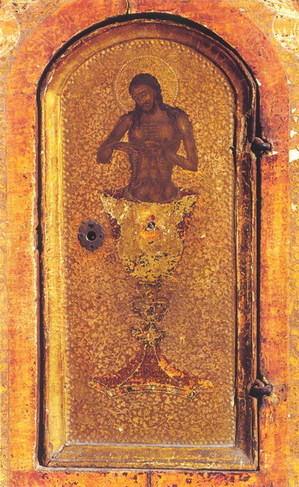Cast the burden of thy cares upon the Lord

Tuesday of the Second Week in Lent
For me, this old tabernacle door depicting Our Lord standing in a chalice and filling it with the Blood and Water that flow from His pierced side, speaks of the utter humility of God in the Sacrament of His Love. He is hidden and silent, yet ready at every moment of the day and night to reveal His Eucharistic Face to those who seek it. “Cast the burden of thy cares upon me,” He says, “and I will nourish you” (Gradual of Today’s Mass)
Tibi dixit cor meum
My heart hath said to Thee:
I have sought Thy face.
Thy face, O Lord, will I still seek:
turn not away Thy face from me.
V. The Lord is my light and my salvation:
whom shall I fear?
(Introit: Ps 26, 8-9, 1)
Today’s poignant Introit in the Third Mode expresses the deepest desires of the human heart. The heart bears witness to that for which every man was created: to gaze upon the Face of God. The voice of one’s own heart can be drowned out by noise, muffled by an accumulation of earthly comforts, or ignored by seeking any one of a multitude of fleeting gratifications; still, in the silence, the voice of the human heart says persistently, and almost with every beat: Seek the Face of Lord.
One who seeks the Face of Lord finds it; and one who finds the Face of Lord has eyes for nothing else. One who has discovered the radiance of the Human Face of God declares for all to hear: “The Lord is my illumination and my health: whom have I to fear?”
Jacta cogitatum tuum in Domino
Cast the burden of thy cares upon the Lord,
and He will sustain Thee.
V. When I cried unto the Lord He heard my voice
to save me from them that drew near to me.
(Gradual: Ps 54, 23, 17, 18, 19)
In the Lesson from the Book of Kings, both the prophet Elias and the widow of Sareptha found themselves in dire need. The prophet was thirsty and hungry; the widow was completely indigent, having not so much as a morsel of bread in her house. At the prophet’s word, the widow cast the burden of her cares upon the Lord, and the Lord provided not only for the prophet, but also for her and for her son. From that day on there was still flour in her jar, and still oil in her cruse.
I cast the burden of my cares upon the Lord when I fix the gaze of my soul upon His Face and trust Him to care for me. The Apostle Peter walked upon the waves with the sea beneath his feet so long as his were fixed upon the Face of Jesus; no sooner did he lower his eyes to consider the dark deep beneath his feet than he began to sink beneath the waves.
Onera gravia et importabilia
The burdens that weigh heavily upon us come from one of three sources: there are burdens laid upon us by the world, burdens laid upon us by ourselves, and burdens laid upon us by the devil. The burdens laid upon us by the world drive us into a frenzied but fruitless activism, exhausting the soul, little by little, until the soul falls prostrate beneath their weight.
The burdens we lay upon ourselves are, more often than not, devised by our pride, by the need to excel, or to meet some unrealistic ideal (even of moral perfection), or to gratify some sensual appetite. These burdens crush the soul and leave it lifeless beneath their weight.
The burdens thrust upon us by the devil cut into the flesh and grow heavier with every passing hour and day. Satan is the prince of those who fasten up packs too heavy to be borne, and lay them on men’s shoulders. Any burden, even one of ascetical practices or good works, assumed without the permission of one’s spiritual father can become Satan’s package. He delights in seeing one falter beneath its weight, and laughs derisively at those who stagger beneath the burden of one’s own pride.
Qui se humiliaverit
The humble man need never carry a burden. He goes forward, with eyes fixed upon the radiant Face of Jesus, so aware of his weakness and so confident in the grace of Christ that, as if by instinct, he casts every care upon the Lord. Thus is he able to sing in the words of today’s Communion Antiphon:
I will recount Thy wonderful doings;
glad and triumphant in Thee
I will sing psalms to Thy Name, O Most High.
(Communion: Ps 9, 2-3)
